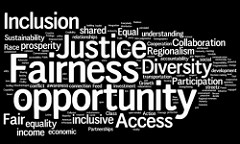It seems that there is a new hashtag campaign every day, advocating for this, boycotting that, bringing awareness to some new cause. Some of these campaigns are more successful than others, protests which once took extensive planning can occur in a short span of time and simultaneously around the world (such as the Women’s March or Climate March that occurred earlier this year), images of companies, groups, or individuals can be destroyed or lifted up (such as #boycottUnited, or NASA’s #ayearinspace). But how does one hashtag outlive others, and why are some successful while others never achieve a viral status?

Although there is a history of failed social activism, we are seeing increasing more successful campaigns and social media is becoming the platform of choice for activists to share their story.

Sabina Khan-Ibarra makes several points in her article The Case for Social and Hashtag Activism as to why activists are choosing social media. She acknowledges that social media allows us to reach more people, more quickly in order to share our message, that conversations can happen worldwide instead of in a localized area, that those who are not able to leave the home are able to access the cause, and that social media creates an engaged and interactive audience. Her strongest point, is that social media gives the average person the ability to call out injustices, inaccuracies, and misrepresentations and be heard by a large audience. Although there are many that will just “retweet”, “share”, or “like” a post, these slacktivists are still useful as they are serving as a means to continue to share the message to those who will take action and therefore, we are not losing out on the purpose because those sitting on their couch do nothing but click a button.
In fact, it is the average person’s pleas that are often form the most successful campaigns. Jonathan Moyer’s article describes how campaigns such as #BlackLivesMatter tap into feelings that are already present and prevalent in our society and this is why they are sustainable. When we are looking at issues that touch the general public, we are more likely to go out and say something, to act on our thoughts that would typically only solicit a retweet or a share. When we use social media to try to demean or punish brands for their actions (such as United Airlines) it doesn’t “hit home” in the same way as systemic prejudice.
“[…]people are now faced with real, personal, unavoidable issues that drive them into public spaces to attempt to break down oppressive structures.”
-Jonathan Moyer, Political Activism on Social Media has Grown Some Teeth
Campaigns such as #BlackLivesMatter, #WomensMarch, and #ClimateMarch demonstrate that there is meaning and worth in social activism, the trick is finding the appropriate means and motivation. Caroline Dadas looks at the trend of hashtag activism and proposes considerations and warnings for those who wish to engage online.
“I argue that those engaging in hashtag activism need an understanding of the political and historical context of the issue(s) they are describing; an awareness of how rhetorical velocity and remix might affect their tweets; and a willingness to include links to reputable news stories in their tweets, in addition to other factors.”
-Dadas, Hashtag Activism: The Promise of Risk and Attention (p. 18)
Dadas pushes the need to ensure that activists consider the brevity of hashtags that they will be using to invoke change as well as the ways in which the hashtag and the images used to support their cause can be skewed, such as how #yesallwomen saw a counter #notallmen campaign.

So is it possible to have productive conversations about social justice online? Yes. Following the suggestions of Dadas, the conversation needs to use simple hashtags, and be cognizant of the various political, historical, and social contexts of the topic to ensure that the cause is interpreted in the correct manner. There will be naysayers, just as there are in any social justice conversation, and these need to be addressed in an assertive but conversational manner and backed with research.
Using social media will likely be the activism of the future and I agree with Katia Hildebrandt that:
“If we are online, as educators, and we remain silent about issues of social justice, if we tweet only about educational resources and not about the release of the Truth and Reconciliation Commission report in Canada, or about the burning of Black churches in the southern United States, we are sending a clear message: These issues are not important.”
-Katia Hildebrandt, In online spaces, silence speaks as loudly as words
Our students need us to model how to engage online, to be digital citizens, and to speak for what we believe in. We need to model and teach how to engage in social justice issues to ensure that, when our students are in our shoes, they are equipped to engage in our ever increasingly online world to enact change and share their passions. Otherwise, we are leaving our students ill-equipped to succeed and grow in their future.
Do you agree that teachers need to be engaged in social activism? Is it their responsibility to help our students develop the digital skills they need to enact social change? Do you think the potential risks that educators may encounter when engaging in social justice online are “worth it”? I would love to hear your opinions!

Hey Kara!
Great post! In answer to your question, I think that it is important for teachers to be engaged with social media activism. However, I think that there are certain ways for that to happen and the approach will depend a lot on the teacher’s comfort zone. For example, a teacher could share a link with appropriate literature for reading to your kids about reconciliation as opposed to posting a highly debated topic in the media. Instead of posing a political argument on #blacklivesmatter, the teacher could post a link to literature for the classroom on anti-racist education. I think this is still taking a stand and it is comfortable place to start.
Thanks!
Colleen
LikeLike